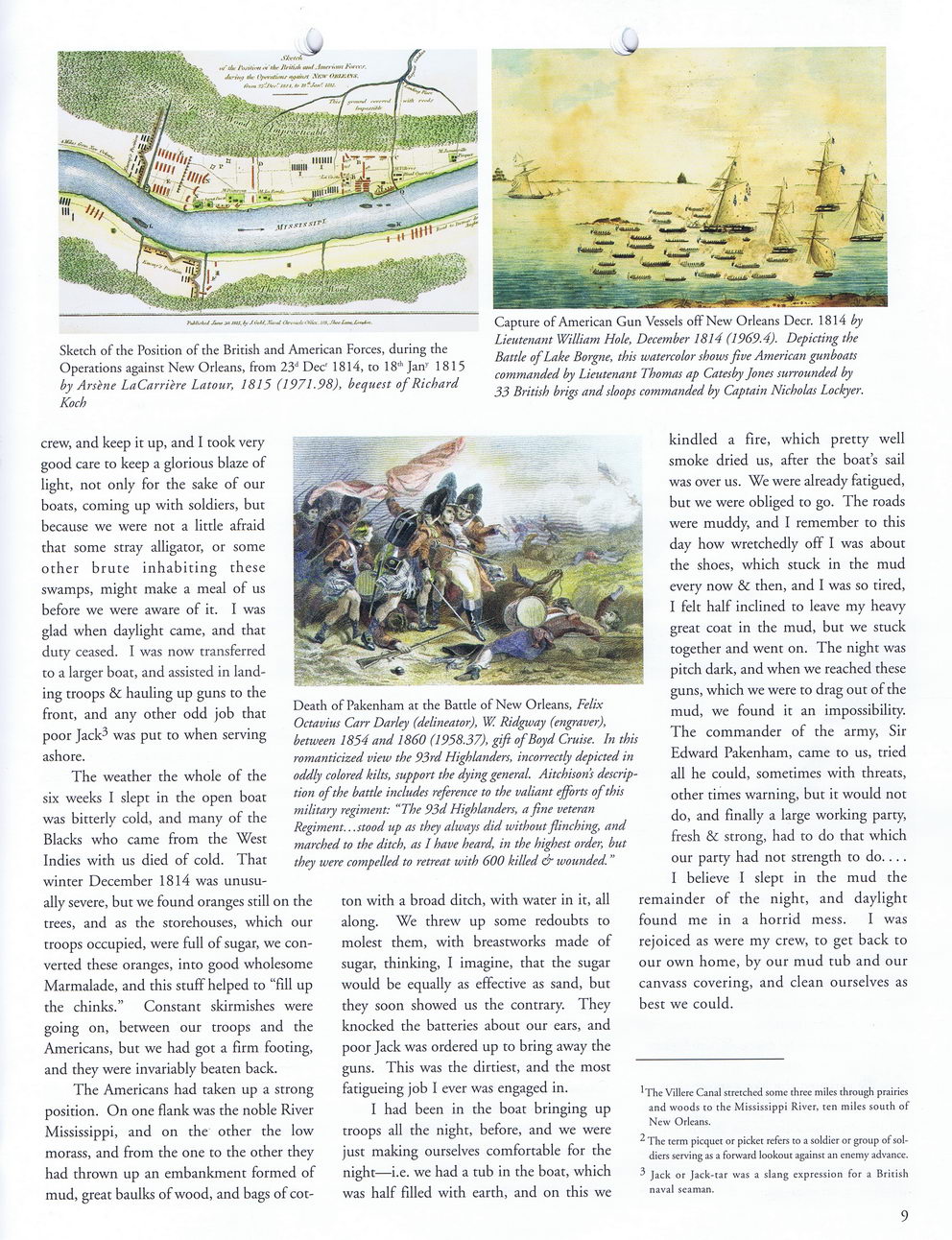This text was obtained via automated optical character recognition.
It has not been edited and may therefore contain several errors.
Sketch of the Position of the British and American Forces, during the Operations against New Orleans, from 23d Dec' 1814, to 1S* Janv 1815 by Arsene LaCarriere Latour, 1815 (1971.98), bequest of Richard Koch Capture of American Gun Vessels off New Orleans Deer. 1814 by Lieutenant William Hole, December 1814 (1969.4). Depicting the Battle of Lake Borgne, this watercolor shows five American gunboats commanded by Lieutenant Thomas ap Catesby Jones surrounded by 33 British brigs and sloops commanded by Captain Nicholas Lockyer. Death of Pakenham at the Battle of New Orleans, Felix Octavius Carr Darley (delineator), W Ridgway (engraver), between 1854 and 1860 (1958.37), gift of Boyd Cruise. In this romanticized view the 93rd Highlanders, incorrectly depicted in oddly colored kilts, support the dying general. Aitchisons description of the battle includes reference to the valiant efforts of this military regiment: ?The 93d Highlanders, a fine veteran Regiment... stood up as they always did without flinching, and marched to the ditch, as I have heard, in the highest order, but they were compelled to retreat with 600 killed & wounded. ? crew, and keep it up, and I took very good care to keep a glorious blaze of light, not only for the sake of our boats, coming up with soldiers, but because we were not a little afraid that some stray alligator, or some other brute inhabiting these swamps, might make a meal of us before we were aware of it. I was glad when daylight came, and that duty ceased. I was now transferred to a larger boat, and assisted in landing troops & hauling up guns to the front, and any other odd job that poor Jack^ was put to when serving ashore. The weather the whole of the six weeks I slept in the open boat was bitterly cold, and many of the Blacks who came from the West Indies with us died of cold. That winter December 1814 was unusually severe, but we found oranges still on the trees, and as the storehouses, which our troops occupied, were full of sugar, we converted these oranges, into good wholesome Marmalade, and this stuff helped to ?fill up the chinks.? Constant skirmishes were going on, between our troops and the Americans, but we had got a firm footing, and they were invariably beaten back. The Americans had taken up a strong position. On one flank was the noble River Mississippi, and on the other the low morass, and from the one to the other they had thrown up an embankment formed of mud, great baulks of wood, and bags of cot- ton with a broad ditch, with water in it, all along. We threw up some redoubts to molest them, with breastworks made of sugar, thinking, I imagine, that the sugar would be equally as effective as sand, but they soon showed us the contrary. They knocked the batteries about our ears, and poor Jack was ordered up to bring away the guns. This was the dirtiest, and the most fatigueing job I ever was engaged in. I had been in the boat bringing up troops all the night, before, and we were just making ourselves comfortable for the night?i.e. we had a tub in the boat, which was half filled with earth, and on this we kindled a fire, which pretty well smoke dried us, after the boat?s sail was over us. We were already fatigued, but we were obliged to go. The roads were muddy, and I remember to this day how wretchedly off I was about the shoes, which stuck in the mud every now & then, and I was so tired, I felt half inclined to leave my heavy great coat in the mud, but we stuck together and went on. The night was pitch dark, and when we reached these guns, which we were to drag out of the mud, we found it an impossibility. The commander of the army, Sir Edward Pakenham, came to us, tried all he could, sometimes with threats, other times warning, but it would not do, and finally a large working party, fresh & strong, had to do that which our party had not strength to do.... I believe I slept in the mud the remainder of the night, and daylight found me in a horrid mess. I was rejoiced as were my crew, to get back to our own home, by our mud tub and our canvass covering, and clean ourselves as best we could. * The Villere Canal stretched some three miles through prairies and woods to the Mississippi River, ten miles south of New Orleans. ^ The term picquet or picket refers to a soldier or group of soldiers serving as a forward lookout against an enemy advance. ^ Jack or Jack-tar was a slang expression for a British naval seaman. 9

Battle of 1814 Battle-of-New-Orleans-Memoir-2